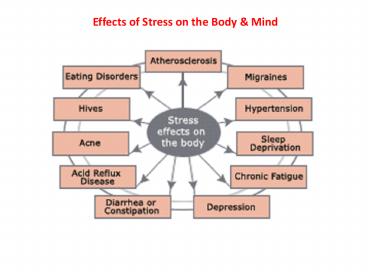Effects of Stress on the Body & Mind PowerPoint PPT Presentation
1 / 15
Title: Effects of Stress on the Body & Mind
1
Effects of Stress on the Body Mind
2
The Medical Model
Dominated medical practice changing
slowly Based on a reductionist approach a
single causative agent Ignored psychosocial
contributions to modern (lifestyle) illnesses
(e.g. CHD)
Psychosomatic models
Psychogenic Somatogenic
Illness without a causative organism a causative
organism is present e.g. asthma, back pain,
migraine exacerbated by stress or
stress makes one more vulnerable e.g.
cold sores, mono
3
Selyes GAS
Illness disease occurs during the exhaustion
phase Chronic stress depletes adaptation
energy through loss of potassium ions loss
of adrenal corticoids weakening of vital
organs Inadequate technology prevented any
further understanding Today 6
psychophysiological theories to explain The link
between stress and disease
4
Autonomic Learning Theory Model
Stressor paired with ANS arousal creates a
learned pattern of emotional arousal Genetic
environmental factors combine to affect the
frequency, intensity, and duration of the
specific body part affected
Psychophysiologic Model
People develop a personal stereotypical response
to stressors This leads to the development of a
weak link, unique to the individual
5
Hypokinetic Model
Physical activity yields increased circulation,
healthy metabolic activity, and endocrine
balance Stress related disease takes hold in the
absence of physical activity
Disregulation Model
Chronic overstimulation of organs by stress
disrupts neural and biochemical signals to and
from the brain and body Organs and systems fail
to get proper feedback and they subsequently
break down
6
Conflict Theory Model
Specific psychosocial conflicts lead to specific
disease outcomes involving specific organs No
evidence for this reductionist approach
Disorders of Arousal Model
Some people are highly susceptible to limbic
system arousal Limbic Hypersensitivity
Phenomenon (LHP) Potential stressors trigger LHP
lead to the stress response If this occurs too
often or is sustained to long overstimulates
organs and and systems leads to their
breakdown Good evidence for this.
7
Effects of Acute, Intense Stress on Disease
Effects not harmful if energy is used up
disease risk is minimal Problem if stress is too
intense or occurs too often ANXIETY
DISORDERS Panic Attacks intense fear couple
physiological symptoms trigger may
not be known, comes on w/out warning
http//www.youtube.com/watch?v-0L84Y-
zxK0featurerelated Acute Stress Disorder
person suffers from frequent panic attacks
in response to a traumatic event (could be
vicarious) does not persist beyond
4 weeks PTSD frequent panic attacks which
persist beyond 4 weeks chronic
neuroendocrine and ANS arousal, flashbacks,
social isolation
http//www.youtube.com/watch?vRRv56gsqkzsfeature
fvwrel
8
Effects of Chronic, Mild Stress on Disease
Insidious because symptoms go unnoticed until
its too late
Physical Illness. Especially psychogenic
Chronic stress can lead to many endocrine
disorders hormonal imbalances Heart Disease
epinephrine constricts blood vessels, increases
BP, can lead to
hypertension norepinephrine also
increases BP and damages the endothelium
precursor to atherosclerosis
(hardening of the arteries)
norepinephrine converts testosterone to estradiol
elevated in
people who have had a heart attack
cortisol keeps E and NE high, increases bad
cholesterol, and also damages the
endothelium
9
Sexual Dysfunction any of the following phases
may be impaired desire,
excitement, orgasm, resolution
linked to a decrease in testosterone
production in men
women problem compounded by cortisol
(decreases
testosterone) PMS physical and psychological
symptoms appear 2-6 days before menstruation
do negative emotions about menstruation
PMS create stress which then
produces the hormonal imbalances associated with
PMS or do the physical symptoms
of PMS appear first which then
triggers stress
10
Muscular System Disorders Result when bracing
occurs in the skeletal, smooth, or cardiac
muscle Chronic muscle tension muscular pain
(back ache), head ache, constipation,
Temporomandibular (TMJ) syndrome All are
compounded by messages from the muscles to the
brain reinforcing the stress message
11
Cardiovascular System Disorders Stress can
affect any of the three Components pumps, tubes,
fluid Since blood pumped by the heart Nourishes
all body systems, any Cardiovascular problem can
affect any system or organ Body Story the what
and whys of a heart attack http//www.youtube.co
m/watch?vMyZ1-haX_ZE (start at
125) http//www.youtube.com/watch?vRtCbJoIDslE
NR1 http//www.youtube.com/watch?v9hxzHqG5Vg8N
R1
12
Cardiovascular System Disorders -
continued Stress Related Migraines Also called
vascular headaches because the carotid artery is
involved Pre-headache phase is called the
prodrome carotid artery constricts Symptoms
include nausea, irritability, noise light
sensitivity, flashing lights in the visual
field About 2 hours later, carotid artery swells
and headache ensues Implicated causal factors
genetics, low serotonin levels, personality
characteristics (ambitious, rigid,
perfectionistic, tense
resentful, efficient
poised, anger, repressed rage,
and STRESS
13
Immune System Disorders Stress may result in
immunosuppression or hyperimmunity Psychoneuroimm
unology studies the interaction between mind,
the CNS, and
the immune system came about in
1964 Immunosuppression triggered by chronic
stress, depression and anxiety may be due to
elevated cortisol levels, depletion of vitamins B
C chronic stimulation leads to the breakdown
of the immune system Hyperimmunity exaggerated
immune response the body attacks
itself examples rheumatoid arthritis,
psoriasis, systemic lupus
14
Allergies Foreign invaders (antigens) trigger
the release of histamine Normally, histamines
deactivate the antigen In hyperimmunity, excess
histamine triggers an inflammatory
response Stress and negative emotions can
trigger an asthma attack or make an attack worse
Digestive System Disorders Chronic stress
chronic smooth muscle tension diarrhea,
constipation
15
Chronic Stress and Psychological Illness
Burnout characterized by emotional exhaustion,
depersonalization, perceived
lack of personal accomplishment. Found in the
helping/service industries
sufferers have many type A personality
traits Anxiety disorders general anxiety,
panic disorder, phobias, acute stress, PTSD
do not always have a specific,
identifiable cause Mood disorders major
depressive disorder, bipolar, SADS Suicide
rates are on the increase among adolescents
college age people depression is
linked to the majority of cases

